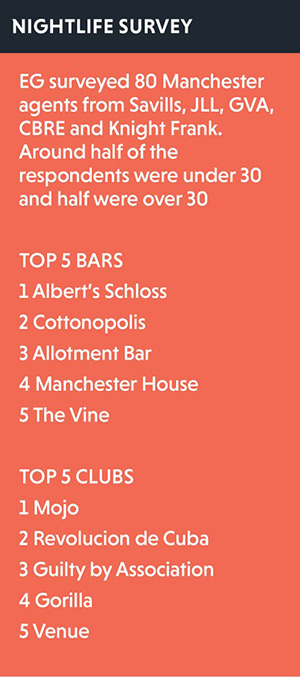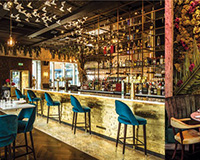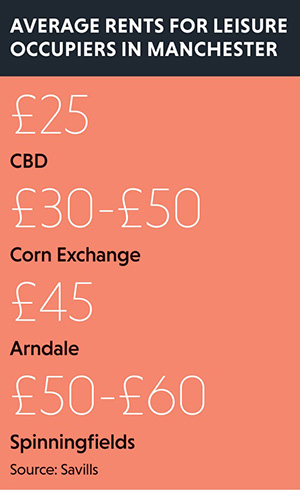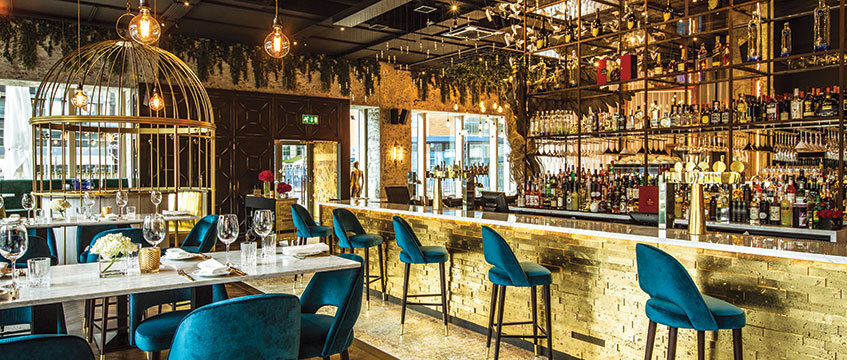It’s 7pm on Friday night in Manchester and suited workers young and old are mingling with performers dressed in retro ski wear against a backdrop of live jazz music.
Albert’s Schloss, the Bavarian-inspired beer hall on Peter Street, is a long way from the ski resorts of Val Thorens and St Anton, but venue owners Mission Mars are doing a convincing job of creating Manchester’s answer to apres-ski.
The bar, opened in 2015 by a joint venture between Manchester-based Trof Group and Revolution bar founders Roy Ellis and Neil Macleod, is one of a raft of new drinking dens that have opened in the city in the past two years to cater for the growing services sector. An EG survey of 80 Manchester agents placed Albert’s Schloss as the number one nightspot in the city, with the most votes for “favourite bar” in both the under 30 and over 30 category.
Manchester’s night-time economy is growing, fuelled by a return to city centre living, growth in affluent workers and increasing tourism. In 2016 the city council granted 758 new alcohol licences in the city centre – up 26% compared with 2010.
However, not all new leisure concepts succeed. Burger & Lobster, the Mayfair-born dining concept, lasted 11 months on King Street before admitting it hadn’t found the right venue for the city. So what does it take to make it in Manchester?
Cigarettes & Alcohol
“I was looking for some action, but all I found was cigarettes and alcohol,” went Oasis lead singer Liam Gallagher’s 1994 clarion call to the disaffected youth outside London.
The Manchester band formed part of a golden era of music and club culture in the city in the 80s and 90s, playing their first gig at The Boardwalk in Little Peter Street in 1991.
Colin Sinclair started the club as a recording studio but later saw the opportunity for a live music venue, which launched in 1986. “Bands had nowhere to rehearse,” recalls Sinclair, who is now a familiar face in property and is executive director of Liverpool Knowledge Quarter. “In 1984 Manchester was really quite a depressed city. In that era Sir Howard Bernstein hadn’t come on the scene yet and there were loads of empty buildings.”
The legendary venue closed its curtains for the last time in 1999, which Sinclair said was mainly due to the impact of new council regulations that gave bars 4am licenses.
 “When the 4am licenses came in, I needed the same number of doormen to keep the gangs out so I would have to pay them an extra two hours. I didn’t get more people and they didn’t drink more. Also, why would you pay to queue outside a club when you could get into a bar for free?”
“When the 4am licenses came in, I needed the same number of doormen to keep the gangs out so I would have to pay them an extra two hours. I didn’t get more people and they didn’t drink more. Also, why would you pay to queue outside a club when you could get into a bar for free?”
Nightclubs today continue to struggle against competition from bars like Albert’s Schloss, which blur the boundaries between after-work drinks haunt and live music venue.
Manchester’s gay village around Canal Street, near Piccadilly Station, is one area which has suffered a series of closures. Iain Scott ran Canal Street club Taurus for 20 years but had to close it in 2015. The upper floors are now being converted into eight flats.
“It was becoming impossible to sustain, even with good business,” he says. “It used to cost us £2,000 a week just to open the door, before we employed anyone, paid for the food and drink. We worked all day every day, but we were small and independent. We couldn’t be subsidised as many are by a kind of group ownership.”
Champagne Supernova
Some of the smaller, independent bars and clubs are being helped by landlords who want to use them to attract high-paying office occupiers.
The technique was pioneered by Allied London chief executive Mike Ingall at Spinningfields, where he says he deliberately charged lower rents to interesting food and beverage outlets to help attract office occupiers. (Although the area now commands the highest rents for leisure occupiers at around £50-60 per sq ft, according to Savills.)
On the edge of the city in Salford, the same tactic has been employed successfully at English Cities Fund’s One New Bailey, a joint venture between Muse Developments, Legal & General Property and the Homes and Communities Agency where magic circle law firm Freshfields has signed to open an 80,000 sq ft office.
The developer signed up Menagerie, an “immersive dining and drinking experience” where champagne flows and one cocktail is served with a burning faux £20 note “garnish”, before wooing office occupiers.
Phil Mayall, development director at Muse, says it was a deliberate tactic. “More and more you get HR involved at day one [of office occupier discussions]. And the questions you get are, if I’m trying to attract somebody to work with us and for us, what do I tell them in terms of how they get here, what they do when they’re here. Does everything close at 5pm?”
Mayall says landlords have to work with new concepts and negotiate a realistic rent. “There’s no point high-fiving to say that you’ve achieved the record rent in town only to see that the shutters are down six months afterwards. Nobody’s won in that respect.”

Karina Jadhav, founder of Menagerie, says despite the help and two years rent free on a 25-year lease with a 15-year break option, it is a challenging business when you have to contend with business rates, which are half your rent.
However, she is banking on the income from Manchester’s growing affluent professional classes from the city’s office sector, football clubs and nearby Cheshire.
“A lot of the people coming to the restaurant have been to St Tropez, they’ve been to LA, they’ve been to Miami, and Ibiza and they’re like ‘oh right, this is like such a place’. So there is an understanding there with a lot of the customer base.”
Live Forever
 Local knowledge helps. Ross Mackenzie, co-founder of Black Dog Ballroom and The Liars Club, which now has seven bars across the city including pizza parlour Crazy Pedros, says: “You know the gaps in the market and you get the knowledge of what sites are coming up.”
Local knowledge helps. Ross Mackenzie, co-founder of Black Dog Ballroom and The Liars Club, which now has seven bars across the city including pizza parlour Crazy Pedros, says: “You know the gaps in the market and you get the knowledge of what sites are coming up.”
Savills leisure director Tom Cunningham agrees. “It’s back to the locals versus the nationals. Those that need to get into the city centre will pay what it takes to get representation to grow the brand, but might not find it as easy to pay the rent as someone who knows the city and knows what’s affordable.”
Nightlife culture is changing, and not only in Manchester. As I write this feature a notification pops up on Facebook from a 25-year-old lead singer of a London-based Feminist punk band: “Jesus Christ nightclubs are bleak.” She played her last gig at a cinema in Whitechapel.
Experienced-based concepts like the Warehouse Project, which regularly changes venue around Greater Manchester, have proved successful.
But Sinclair thinks we should be weary of calling the end of club culture in Manchester. “I think it’s going through a good phase. Albert Hall is a fantastic venue, it’s a great venue for a rock’n’roll gig. And I think it’s important that there are proper gig venues in the city centre.
“Manchester’s brand is based on that kind of cool music scene. Whatever happens music will always come back to a guitar, vocal and drums.”
.Click here to read Colin Sinclair’s thoughts on Manchester’s changing nightlife.











